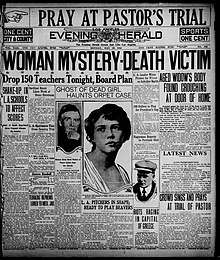Headlinese

Headlinese has a long history. This example is the front page of the Los Angeles Herald issue of May 29, 1916.
Headlinese is an abbreviated form of news writing style used in newspaper headlines.[1] Because space is limited, headlines are written in a compressed telegraphic style, using special syntactic conventions, including:
- Forms of the verb "to be" and articles (a, an, the) are usually omitted.
- Most verbs are in the simple present tense, e.g. "Governor signs bill", while the future is expressed by an infinitive, with to followed by a verb, as in "Governor to sign bill".
- In the United States, conjunctions are often replaced by a comma, as in "Bush, Blair laugh off microphone mishap".[2]
- Individuals are usually specified by surname only, with no honorifics.
- Organizations and institutions are often indicated by metonymy: "Wall Street" for "the financial industry", "Whitehall" for the UK government administration, "Madrid" for "the government of Spain", "Davos" for "World Economic Forum", and so on.
- Many abbreviations, including contractions and acronyms, are used: in the US, some examples are Dems (for "Democrats") and GOP (for the Republican Party from the nickname "Grand Old Party"); in the UK, Lib Dems (for the Liberal Democrats), Tories (for the Conservative Party). The period (full point) is usually omitted from these abbreviations, though U.S. may retain them, especially in all-caps headlines to avoid confusion with the word us.
- Lack of a terminating full stop (period) even if the headline forms a complete sentence.
Some periodicals have their own distinctive headline styles, such as Variety and its entertainment-jargon headlines, most famously "Sticks Nix Hick Pix".
Commonly used short words
To save space, headlines often use extremely short words (many of which are not in common use otherwise) in unusual or idiosyncratic ways:
- axe (eliminate)
- bid (attempt)
- blast (heavily criticize)
- cagers (basketball team - "cage" is an old term for indoor court)[3]
- chop (eliminate)
- confab (meeting)[4]
- eye (consider)
- fold (shut down)
- gambit (attempt)
- hike (increase)
- ink (sign a contract)
- laud (to praise)
- lull (a pause)
- mar (to damage, harm)
- mull (contemplate)
- nab (grab)
- nix (reject)
- parley (meeting)
- pen (write)
- rap (criticize)
- see (forecast)
- slam (heavily criticize)
- solon (judge)
- tap (select e.g. an appointee)
- tout
Many verbs can be converted into nouns, e.g. "rap" could be understood as either "criticize" or "criticism" depending on context.
See also
- Copy editing
- Corporate jargon
- Ellipsis, omission of words
- Syntactic ambiguity § In headlines
- Journalese
References
- ↑ Headlinese Collated definitions via www.wordnik.com
- ↑ "Bush, Blair laugh off microphone mishap". CNN.com. July 21, 2006. Archived from the original on August 16, 2007. Retrieved July 17, 2007.
- ↑ Sports Illustrated: "When the Court was a Cage"
- ↑ "Is confab still used?"
Further reading
- Mårdh, Ingrid (1980); Headlinese: On the Grammar of English Front Page headlines; "Lund studies in English" series; Lund, Sweden: Liberläromedel/Gleerup; ISBN 91-40-04753-9
- Biber, D. (2007); "Compressed noun phrase structures in newspaper discourse: The competing demands of popularization vs. economy"; in W. Teubert and R. Krishnamurthy (eds.); Corpus linguistics: Critical concepts in linguistics; vol. V, pp. 130–141; London: Routledge
This article is issued from
Wikipedia.
The text is licensed under Creative Commons - Attribution - Sharealike.
Additional terms may apply for the media files.